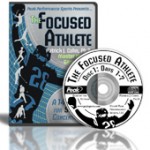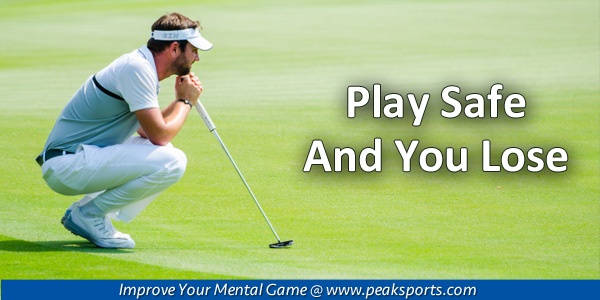Playing Aggressive to Keep Your Lead
Playing safe rarely works out for athletes. Yet many athletes adopt a cautious mindset when leading late in a competition.
For example, a football team has dominated the opposing team for three plus quarters and has a 14-point lead with four minutes remaining…
Instead of sticking to their offensive game plan, they play prevent defense, allowing the opposing team to tie up the game.
Or a gymnast who was in first place previously attacked routines and stuck her landings. All of a sudden, despite consistently hitting her routines, she cautiously performs her final rotation for fear of falling only to bobble three times on the beam, her strongest event.
Or the golfer atop the leader board who has a lead. Playing well, he carried a four-stroke lead into the last three holes. Instead of going for it, he decides to play it safe, double bogeys two of the holes and loses the tournament by one stroke.
You play safe when they fear making mistakes and fear that those mistakes will cost you the competition.
Trying to avoid mistakes is a trap that many athletes fall into. Fear creates anxiety which trust in your skill, fills your head with worry, creates doubt and often leads to making mistakes you are seeking to avoid.
But playing it safe opens the door for other competitors to erase the lead you built up. In fact, your opponents can sense that you are playing it safe and it gives them confidence to charge forward. Your opponents gain momentum.
If you built a lead by “going for it” or playing aggressively, why would you change this mindset later in the competition? Keep doing what works.
PGA golfer, Patrick Rodgers, fell prey to the play-it-safe mentality and it cost him the victory at the 2017 John Deere Classic.
Rodgers was the leader heading into the final round but had four bogeys including a critical bogey on the 17th hole that ultimately cost him the title.
RODGERS: “Our tendency when you have the lead is to kind of hold on and play safe and guard against making mistakes. But I had guys coming at me with some really low rounds.”
The lesson is to maintain the same style of play that helped you get a lead.
Now that is not to say that you should play recklessly. You have to be smart and aggressive.
The key is to not focus on the victory and continue to play the game one play at a time or one shot at a time. Of course easy for me to say and hard to do.
How to Stay Aggressive and Maintain Your Lead:
If you have never been in the situation that Rogers’ faced, you might anticipate how you would react when leading.
How might your game derailed by distraction, focusing on the outcome, protecting from making mistakes?
How will your respond that help you keep momentum and play in the moment?
Start by getting your copy of “The Focused Athlete” audio and workbook program to learn how to stay focused in the moment…
Related Sports Psychology Articles
- Do You Have An Athlete Who Plays It Safe When In The Lead?
- How to Help Athletes Stay Aggressive
- Athletes Who Play Too Safe During Games
*Subscribe to The Sports Psychology Podcast on iTunes
*Subscribe to The Sports Psychology Podcast on Spotify
Download a free sports psychology report to improve your mental game!
Learn more about our one-on-one mental game coaching.
The Focused Athlete

It’s probably no secret that you have many opportunities to become distracted in sports. Athletes are bombarded with both internal and external distractions everyday in practice and competition. Focused athletes are able to get the most from their skills because they are more efficient with practice and more concentrated in competition. Athletes who lack focus let distractions run wild through their mind and don’t know how to adjust or refocus.
The Focused Athlete was developed for any level coach, parent, or junior to professional athlete who wants to improve performance and gain a competitive edge. It does not matter if you are a fledgling junior athlete; or a seasoned professional, plagued with distractions; or you just wanting to learn how to improve concentration…
“The Focused Athlete” is a complete system to teach you how to focus like a champion and harness the power of a zone focus every time you step on the playing field, court, track, or course in practice and games!


I took up playing pool 3 1/2 years ago at age 58. Many in my league have been playing steady 15-30 years. Although I practiced relentlessly I had no idea how anxious I was during league nite or in the few tournaments I played in. No after just 3 weeks with the confident athlete program I am seeing a big difference. I am finding the confidence and calmness in a sport where accuracy and control mean everything. I look forward to working with all the Confident Athlete Resources.